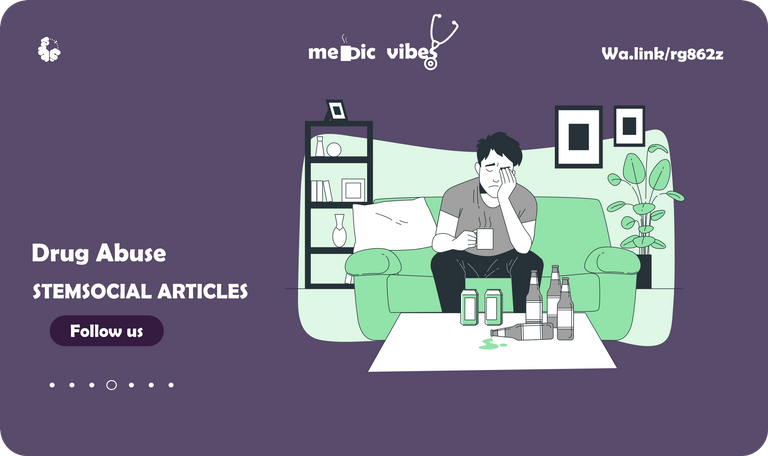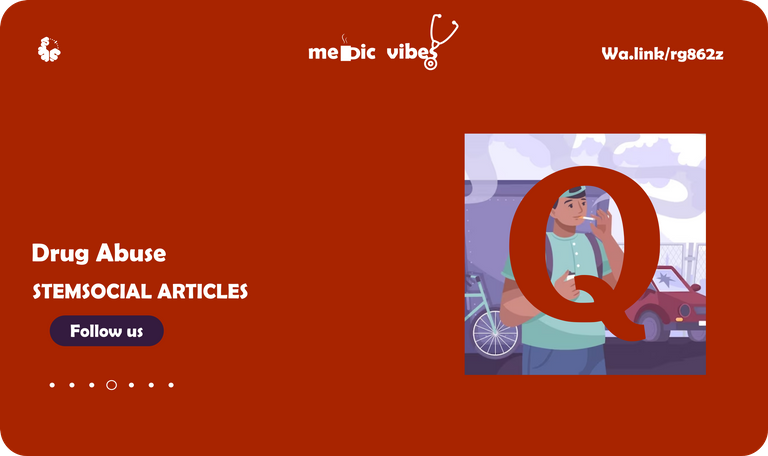In the last post, we saw how:
- Cannabis is widely used illicit drug; prevalent in youth culture; fourth most used psychoactive drug in US.
- Substance abuse causes detrimental mental, physical, and social effects.
- Treatment for cannabis use includes abstinence, support, therapy, and health education. Legal use limited to medical conditions under physician supervision.
[https://qr.ae/prwpR5](What are the short and long term consequences of substance abuse?)
Welcome to Medic Vibes, where we discuss mental health disorders and make sense of them. Dr Ebingo Kigigha is a medical doctor (aspiring psychiatrist) and creative person (illustration and music). This has been our routine for four consecutive months. This month will be dedicated to substance abuse. In the first month, we discussed Depression, and in the subsequent month, anxiety. We just finished with Conduct disorders.
In this post, we are looking at A Nigerian Study on Substance Abuse. To learn more just keep scrolling down. You can also skip to the key point of the post if you which or go to the conclusion to get the summary.

Everything you need to know about Substance Abuse

Image by macrovector on Freepik
Substance use disorder in psychiatry is a condition that has dangerous consequences because of the irresponsible use of psychoactive substances such as alcohol and illicit drugs. This disorder is a diagnosable condition in the Diagnostic and Statistical Manual of Mental Disorders (DSM-5). There are specific symptoms that are seen in this condition such as tolerance, withdrawal, and substance-seeking behaviour.
There are different substances that are abused in substance abuse disorder such as alcohol, opioids, stimulants, and cannabis. Substance abuse is a matter of public health significance, and its effect is noted among millions of people around the world. There are some risk factors associated with substance disorder, just like in other medical conditions, including family history of substance abuse and co-morbid mental health problems.
The effects of substance abuse can be lethal or lead to a low quality of life for those who use the substance and for their loved ones. The range of the effect of substance disorder is wide-reaching and can span from mental health problems to medical complications and also the effects of clumsiness and an increased rate of accidents.
The treatment for substance abuse comprises pharmacotherapy and psychotherapy. Some drugs that are typically used to manage this condition are methadone and buprenorphine. These drugs reduce the symptoms and the craving associated with substance abuse. The behavioural therapy most commonly used for this condition is cognitive behavioural therapy and contingency management.
One of the best ways to stop this condition in its tracks is with health education. There is proof that education programs are very effective in helping deal with this condition. Some programs are tailored to schools, and other programs are made for the broader community.
In this post, we are going to look at the complexity of substance abuse in a simple way and touch all its dimensions. It is possible to manage the negative effects of this condition with the use of pharmacotherapy and psychotherapy, and with education programs, this condition can be prevented.
Types of Substance Abuse:
Substance abuse includes every kind of self-destructive use of psychoactive substances. The type of substance abuse depends solely on the type of substance that is being abused. It may be alcohol, opioid, stimulants (amphetamines and methamphetamines) or cannabis.
Alcohol is the most accessible of the psychoactive substances and is easily abused everywhere around the world. There are psychiatric conditions associated with its abuse such as depression and anxiety, and in addition, there are medical problems like liver disease and heart diseases. Alcohol also causes drunkenness, leading to accidents and injuries.
Cocaine and methamphetamines are also very likely to be abused because of their very addictive nature. They also have a very high tendency to cause myocardial infarction and strokes, and they can cause cognitive dysfunction and motor dysfunction.
Cannabis is also commonly abused around the world. Many think that it is safe to use, but there are so many medical problems associated with its use. There are many studies that have linked marijuana to anxiety, psychosis, and cognitive dysfunction.
Signs and Symptoms of Substance Abuse:
The features seen in substance abuse vary depending on the particular substance that is being used, but there are general signs that you can see in those who use these substances.
One important one is a change in behavior, including more irritability, changes in sleep patterns, and a lack of motivation. They may also show signs of nausea, shaking hands known as tremors, and changes in their appetite. They can also have these features when they overdose on the substance, and it can lead to death.
Those who are involved in substance abuse usually cannot participate in daily life and can have problems at work, and will have poor school performance. They also tend to reduce their communication with friends and family.
One of the most important features seen in those who are abusing substances is that they tend to seek out the substance. Although this will be done in secret.
Causes of Substance Abuse:
The reason why people abuse or use substances is not as clear as it seems and could be linked to genetics or the person’s physical and social environment.
The genetic interplay seen in those who have substance abuse disorder can be traced to the person’s family and the history of use in their family. It is worth noting that the genetic interplay is not a very strong one, but the proof of the relationship is found in some studies such as family studies and twin studies.
Some psychiatric conditions have also been found to have stronger associations with substance abuse such as depression and anxiety. The belief is that those with these conditions use these drugs as therapy for their condition.
The environmental factors related to substance abuse can be found in the physical and social environment. Factors like poverty, previous trauma, access to the drug, and mental health services.
The Impact of Substance Abuse on Health:
The effects of substance abuse have both long and short-term effects on the individual. Because some of these drugs either create toxins or are toxins themselves, they can have significant effects on vital organs of the body.
We have already noted that the effect of these drugs can cause mental health problems, but in addition, they can also worsen psychiatric conditions. There have been studies that have linked suicide to the use of some drugs.
Those who use these drugs may take lethal doses of these drugs and could die from overdose.
The Impact of Substance Abuse on Relationships and Society:
The effects of substance abuse can also be seen in broader society. The effects are first seen within the family and among friends, adding extra strain to relationships and sometimes leading to conflict, emotional distress, and even ending these relationships.
Its effect on society starts at work, where the risk of losing one's job and becoming a burden to loved ones can increase. There are also legal issues that a person can fall into as they participate in drug-seeking behavior. Those who use drugs can commit crimes and add to the rising number of those in need of help from the healthcare system.
Moreover, substance abuse can have a profound impact on the development and well-being of children, particularly if they are exposed to substance abuse in the home or in their community. Children who are exposed to substance abuse are at an increased risk of a range of negative outcomes, including poor academic performance, behavioral problems, and an increased risk of substance abuse themselves.
Substance Abuse Treatment Options:
There are treatment options available for substance abuse disorders. All treatment options prioritize the particular substance disorder being treated and the person suffering from the condition.
The withdrawal symptoms of substance abuse are best managed with pharmacotherapy and medication. These drugs help reduce the craving associated with these substances. Some of the drugs used to deal with this are methadone, buprenorphine, and naltrexone.
Psychotherapy is another very effective option for these patients. Some of the very effective behavioral therapy options are cognitive-behavioral therapy and contingency management. These psychotherapy sessions help the patient deal with the psychological and emotional problems that lead to substance abuse. This also includes group therapy and support groups, such as Alcoholic Anonymous and Narcotics Anonymous, that give a communal feeling and make sure the patient does not feel alone.
There is also the option of hospital admission and clinic visits for patients who suffer from this condition. The program is usually very intense and may include individual and group sessions. There is more conditioned monitoring of the patient in this approach.
Questions
- What did you learn about Substance abuse?
Conclusion
- Substance use disorder has its consequences, types, risk and treatment options.
- The text discusses signs and symptoms, causes, and the impact of substance abuse on health.
- Substance abuse has negative impacts on relationships, society, and children.

References
- Kaplan-Sadocks-Comprehensive-Textbook-Psychiatry
- Page demarcations made with Inkscape.org
- Healthline
- NIMH
- WHO

